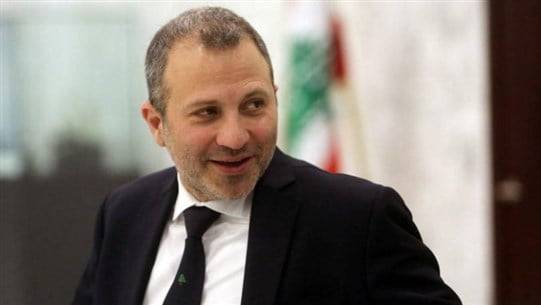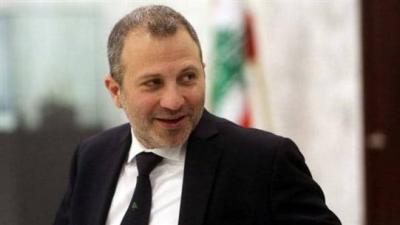The open war between the caretaker Prime Minister Najib Mikati and the leader of the "Free Patriotic Movement," MP Gebran Bassil, representing President Michel Aoun regarding the formation of the government has entered a new political phase characterized by heightened tensions. This follows Bassil's request that ministers affiliated with the presidential team boycott cabinet sessions and ministerial meetings, and withdraw from parliamentary sessions; a move aimed at intimidating the designated president into conceding to his impossible conditions as a mandatory passage to ensure continuity just 10 days before Aoun’s presidential term ends, as he prepares to leave the presidential palace in Baabda for his home in Rabieh.
Bassil has started preparing to manage the presidential vacancy in his own style, summoning Foreign Minister Abdallah Bou Habib, Defense Minister retired Major General Morris Slim, Social Affairs Minister Hector Hajjar, Energy Minister Walid Fayyad, Economy Minister Amin Salam, and Minister of Displaced Persons Issam Charafeddine for this purpose. The Justice Minister Henry Khoury was absent from the meeting hosted at the “Movement’s” headquarters due to being outside the country. Sources from the ministerial circles informed the "Middle East" that Bassil dictated to the ministers his operational orders, which are akin to an "emergency plan" to fill the vacuum during the presidency's void, stemming from the impossibility of electing a president within the constitutional timeframe, positioning himself as a substitute due to the failure to form a new government that meets his impossible conditions.
The ministerial sources revealed that three ministers who attended the meeting expressed their full willingness to comply with Bassil's request to abstain from attending cabinet sessions and boycotting parliamentary sessions: Hajjar, Charafeddine, and Fayyad, showing harmony with his requests, in contrast to their colleagues who were not convinced of the usefulness of what Bassil dictated to them.
The sources noted that Bassil was tense in his response to the ministers who raised observations regarding the operational orders, describing the political atmosphere as tense between Bassil and the ministers who voiced their concerns about his requests, especially since most participants in the meeting were among those subject to being replaced by other ministers after Aoun referred to them as “sleepy,” accusing them of not standing up to Mikati.
The sources observed that Bassil only hinted at escalating his open war with Mikati after realizing that the latter was not inclined to concede to his conditions, which he seeks to ensure Aoun's continuity after leaving Baabda to preserve his political legacy. They stated that anyone wanting to facilitate the designated president's government formation or rescue the current government would not shut the door to attempts aimed at relieving the stalled formation process.
While these sources ruled out the possibility of Aoun, preparing to leave Baabda, signing a decree for the government's resignation, it is not only because it would be resigned upon the election of a new parliament, but also because such a step, if he chose to issue the decree, would negatively backfire on him, holding him accountable for dragging the country into further crises. The sources questioned whether he could handle the repercussions of his decision and the responses to such a step.
Where does Hezbollah stand, which he accommodates but is cautious about involving in a confrontation with the Sunni community that may lead to renewed Sunni-Shiite tensions? Despite the party not willing to jeopardize its modest popularity through its Sunni allies, especially since Parliament Speaker Nabih Berri would not partner in such a venture.
Ministerial sources accused Bassil of exaggerating the situation, believing he has nothing to lose and is now trying to threaten to push the country to the brink of collapse, thinking Mikati will concede to his conditions, although he is fully aware that this gamble is misplaced. They viewed the only solution to escape the deadlock is through electing a president within the constitutional timeframe.
Furthermore, the sources, while discounting Aoun's resort to issuing a decree for the government's resignation, also placed the ball in Bassil's court for the final decision after Aoun relinquished his powers related to his role in government formation consultations and agreed to transfer them in favor of his political heir.
It was argued that Aoun bears direct responsibility for the impasse surrounding the formation of a new government or rehabilitating the current one, especially as Mikati refuses to negotiate with Bassil, leading to the acceptance of his conditions since his candidate for the presidency is the vacuum, as long as he has no chances of being one of the candidates. He is now trying to put his ally Hezbollah in an embarrassing position by refusing to support the candidacy of the leader of the "Marada Movement," former MP Sleiman Frangieh, while simultaneously opposing constitutional amendments that would open the door for Army Commander General Joseph Aoun to enter the competition, especially since the presidential void will inevitably lead to a reshuffling of the cards regarding candidacies.
Despite Hezbollah maintaining silence regarding Bassil's insistence on excluding his other ally from leading the presidential race, Bassil does not want to form or salvage the current government; for those wishing to facilitate the task of the designated president, as the ministerial sources say, would not go to extremes in dismantling bridges for a new government by resorting to threats and would find themselves alone in the confrontation if they wanted to exceed the red lines by targeting civil peace.
Thus, Bassil is attempting to consolidate pressure points in the hope of compelling major voters outside the borders to open channels of communication with him, based on his insistence on leveraging the achievement made in demarcating maritime borders between Lebanon and Israel, after Aoun secured him the top position among those who sought Hezbollah's assistance to facilitate the agreement's birth.
According to the ministerial sources, Bassil is currently striving to establish his presence and, with support from a resolute stance on the presidential file, hoping to re-establish communication channels with Washington; in an attempt to lift the US sanctions imposed on him, benefiting from the openness of American parties toward him under the guise of his role in border demarcation, which would allow him to polish his image and re-enter the race for the presidency, even though he is fully aware of the challenges he faces in securing political "amnesty" from his rivals domestically after entangling himself in political confrontations that targeted all parties except his ally Hezbollah.




